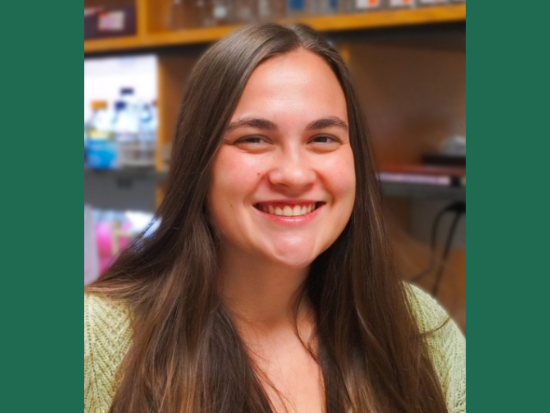 Sara Edmonds, a Ph.D. candidate in UAB’s Graduate Biomedical Sciences (GBS) program, was recently awarded a prestigious two-year, $82,712 F31 grant from the National Institutes of Health (NIH) for her research title “The role of capsule production on the physiology of an oral commensal.” Edmonds is training in the lab of Jessica Scoffield, Ph.D., associate professor in the UAB Department of Microbiology.
Sara Edmonds, a Ph.D. candidate in UAB’s Graduate Biomedical Sciences (GBS) program, was recently awarded a prestigious two-year, $82,712 F31 grant from the National Institutes of Health (NIH) for her research title “The role of capsule production on the physiology of an oral commensal.” Edmonds is training in the lab of Jessica Scoffield, Ph.D., associate professor in the UAB Department of Microbiology.
The NIH created the highly competitive F31 for predoctoral researchers in the biomedical, behavioral, or clinical sciences currently enrolled in a Ph.D. or equivalent research degree program. It funds mentored research experiences and supports trainees in their development into independent researchers.
Edmonds received her Bachelor of Science in Molecular Biology and Master of Science in Biomolecular Science from Lipscomb University. During her time at Lipscomb, she engaged in summer undergraduate research focused on investigating the impact of microbial-derived metabolites from the intestines, particularly short-chain fatty acids (SCFAs), on the innate immune system, specifically targeting Toll-like receptor 4 (TLR4). She extended this research during her master's program under the guidance of Jon H. Lowrance, Ph.D. with co-mentoring from Beth Conway, Ph.D. at Lipscomb.
At that time, her research expanded to examine the effects of SCFAs on downstream components of TLR4s signaling cascade NF-kB. In addition to her research at Lipscomb, she took part in an oral health mission, traveling multiple times to a remote village in Guatemala. There, she provided oral care education, distributed fluoride treatments, toothbrushes, toothpaste, and assisted dentists in filling cavities, and extracted infected teeth.
After graduation, she took a gap year to work as a Biopharma Technician at Aegis Science Corporation before beginning her Ph.D. in microbiology at UAB in 2021. These experiences fueled her passion for raising awareness about oral health disparities and deepened her appreciation for the role of the human microbiome in influencing health and homeostasis, ultimately leading her to join the lab of Jessica Scoffield, Ph.D.
“Sara is an exceptionally hard worker,” Scoffield said. “She’s dedicated and self-motivated—qualities that a mentor cannot teach. The results Sara has achieved are quite novel and will lead to at least four first-author manuscripts. These upcoming publications, along with the funding of her F31 grant application, will position her well to secure a postdoctoral fellowship.”
Edmonds elaborates on her F31 award and the research it will support.
Give us an overview of your research, specifically regarding the F31 grant.
Edmonds: Diets rich in dark leafy greens are high in dietary nitrate, which can be converted to nitrite by tongue bacteria. The Scoffield Lab has demonstrated that salivary nitrite can react with hydrogen peroxide produced by commensal bacteria to create reactive nitrogen species (RNS) with antimicrobial properties against oral pathogens. One such commensal, Streptococcus parasanguinis, generates RNS that inhibits both oral and respiratory pathogens and is uniquely resistant to RNS. My F31 proposal aims to uncover the molecular mechanisms behind this resistance, focusing on the role of the bacterial capsule—a complex sugar structure that protects the cell. We will investigate how the capsule aids in RNS resistance, pathogen competition, and oral health promotion, and also determine the unknown capsule structure of S. parasanguinis. Our findings will offer new insights into how S. parasanguinis defends the oral cavity against pathogens.
How will this grant propel your research goals going forward?
Edmonds: This F31 grant will allow me to expand my scientific technique repertoire and develop collaborations with other UAB scientists to comprehensively investigate the role of capsules in S. parasanguinis. It will also enable me to attend scientific conferences, ultimately supporting my journey toward becoming an independent investigator and professor.
Anything else you’d like to add?
Edmonds: I am thrilled to receive this award and would like to extend a special thanks to my mentor, Dr. Scoffield, for her unwavering support and guidance as I continue to grow as a trainee.